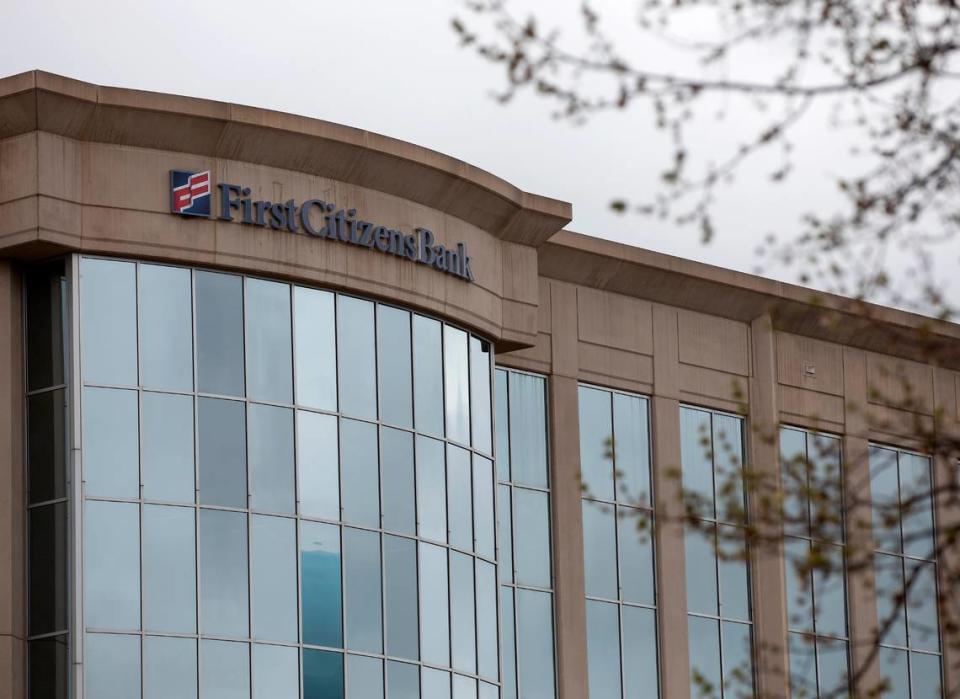Open Source: NC banks are quietly disappearing
I’m Brian Gordon, reporter for The News & Observer, and this is Open Source, a weekly newsletter on business, labor and technology in North Carolina.
I wanted to start with a quick mention of Canton, North Carolina. The western North Carolina town (about 25 minutes west of Asheville) saw its 115-year-old paper mill shutter this week.
Canton was nicknamed “Papertown” and the mill was the economic engine of the community for generations. Reports describe many local residents in mourning.
On Twitter, Canton Mayor Zeb Smathers wrote “It is with a heavy heart, that I can announce, with confirmation from Evergreen, that the last mill whistle will blow at 12 noon this Wednesday, May 24 #milltownforever.”

Small banks in a “too big to fail” world
Over a two-week period in March, following the fall of Silicon Valley Bank, Live Oak Bank in coastal Wilmington saw $250 million in deposits leave its accounts, headed for money markets and the handful of larger banks deemed “to big too fail.”
Live Oak is a relatively new, online-only bank that’s become the national leader in approving a specific type of loan for small businesses. “Small businesses, by nature, have more volatility, so you’ve got to be able to work with them and be along for that journey,” Live Oak President Huntley Garriott said.
After a few weeks of falling balances, Live Oak reversed its decline. Today, it even has more in customer deposits than it did before SVB toppled.
But its long-term future, like that of all small-to-medium size U.S. banks, is not assured. Community and regional banks have been disappearing in North Carolina, and nationwide, long before most had ever heard of SVB.
There were 87 state-chartered banks in April 2003. Ten years ago, there were 71. This year, there are only 35. That’s all according to data from the North Carolina Commissioner of Banks.

Why do small banks matter?
Gerald Cohen, chief economist at UNC’s Kenan Institute of Private Enterprise, said losing them “is deleterious to commercial and industrial loan activity.”
Garriott said Live Oak will make business loans that don’t qualify under the blanket tests used by the “too big to fail” banks.
In some ways, Live Oak seems poised for success. It has $10 billion in assets and has been growing. But banks of its size in North Carolina are slowly becoming endangered, and its a trend that’s hard to ignore.
First Citizens cuts jobs and sues
Silicon Valley Bank was the 16th largest U.S. bank when it collapsed following a bank run in March. Ironically, the 16th largest bank in the country is now Raleigh’s family-owned First Citizens Bank, which purchased SVB two months ago.
First Citizens made two bits of news this week, both SVB-related.
First, First Citizens sued rival HSBC for $1 billion, accusing the London-based financial institution of poaching key former SVB bankers. The operation was allegedly dubbed “Project Colony,” and it featured 42 employees resigning en masse on Easter Sunday.
First Citizens is crying foul. HSBC declined to comment.

The lawsuit was filed on Monday. Two days later, First Citizens CEO Frank Holding Jr. informed staff in a companywide email that former SVB employees would be laid off, some effective immediately.
The bank later told The News & Observer the cuts would affect close to 500 people based across the U.S.
Short Stuff: Workers-wanted ads coming to RDU
Hitachi Energy, a Swiss-based energy systems provider with U.S. headquarters in Raleigh, is launching an ad campaign at the Raleigh-Durham Airport next month in an effort to fill 200 open local positions.
Less than three years ago, the Durham-based gene editing company Life Edit had five local employees. It now has around 70 in the area. After inking a lucrative deal with Novo Nordisk, which could be worth more than $1.92 billion, Life Edit executives believe the firm’s headcount will approach 100 people by the end of the year.
Triangle entrepreneur/investor Bill Spruill (pictured below) donated $900,000 to N.C. State University to help students turn their promising business projects into revenue-generating enterprises.

National Tech Happenings
The Pentagon did not explode this week, but a (likely AI-generated) photo hoax went viral, showing the U.S. Department of Defense headquarters in billows of smoke. Enough people believed it that the Pentagon Force Protection Agency posted on Twitter: “There is NO explosion or incident taking place at or near the Pentagon reservation, and there is no immediate danger or hazards to the public.”
Facebook’s parent company, Meta, conducted its fourth round of layoffs since November, with thousands of job cuts focused on business divisions.
Netflix has started cracking down on password sharing, limiting accounts to single households. It’s a good time to thank your siblings’ exes’ parents.
Thanks for reading!

This story was produced with financial support from a coalition of partners led by Innovate Raleigh as part of an independent journalism fellowship program. The N&O maintains full editorial control of the work.
Open Source
Do you enjoy Triangle tech news? Subscribe to Open Source, The News & Observer's weekly technology newsletter and look for it in your inbox every Friday morning. Sign up here.

